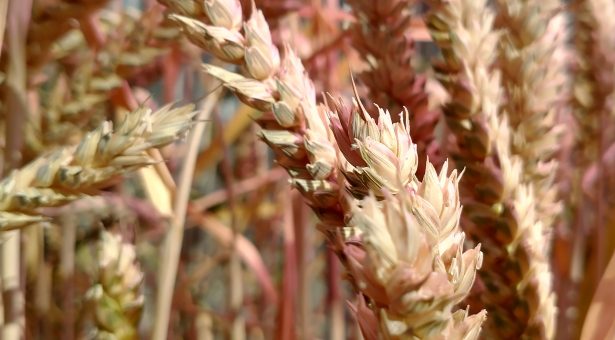Genes associated with resistance to wheat yellow rust

Proposed use
Yellow (stripe) rust caused by the fungus Puccinia striiformis f. sp. tritici (PST) is a major threat to global wheat production. The inventors identified three genes responsible for genetic resistance to yellow rust in wheat, each with distinct pathogen recognition specificity. These genes can be stacked to confer durable resistance to yellow rust.
Problem addressed
Crop diseases pose a threat to global food security. Genetic resistance can reduce crop losses in the field and can be selected using molecular markers. However, it often breaks down due to changes in pathogen virulence as experienced for the wheat yellow rust pathogen. Stacking genes with different pathogen recognition specificities can provide a more durable solution to this problem.
The inventors unravelled the identity of three yellow rust resistance genes in wheat, each with distinct pathogen recognition specificity. This discovery enables the stacking of these genes through genetic modification to achieve durable resistance to yellow rust.
Technology overview
The inventors report the isolation and characterization of three major yellow rust resistance genes, Yr7, Yr5a (syn Yr5) and Yr5b (syn YrSP) from hexaploid wheat, each having a distinct recognition specificity. All three Yr genes encode nucleotide-binding leucine-rich repeat proteins (NLRs) that are known to act as intracellular immune receptors that trigger a series of signalling steps ultimately leading to cell death upon pathogen recognition, preventing the disease from spreading throughout the plant.
The identified genes all contain an integrated non-canonical N-terminal zinc-finger BED domain that is distinct from those found in non-NLR wheat proteins. BED-NLRs are widespread across Angiosperm genomes and in rice this architecture provides resistance to bacterial blast through the NLR Xa1. The present discovery indicates that BED-NLRs can play an important role in crop resistance to fungal diseases.
Stacking the identified genes in wheat, or homologs thereof in related species, can be used to facilitate durable field resistance to fungal pathogens.
Intellectual property information
Published patent application: Publication numbers AU2019253139A1 (Australia), CA3096741A1 (Canada), EP3772909A1 (Europe), and US2021388375A1 (USA); Title “Genes associated with resistance to wheat yellow rust”.
Link to published paper(s)
Marchal, C., Zhang, J., Zhang, P., Fenwick P., Steuernagel B., Adamski N.M., Boyd L., McIntosh R., Wulff B.B.H., Berry S., Lagudah E., Uauy C., 2018. BED-domain-containing immune receptors confer diverse resistance spectra to yellow rust. Nature Plants 4, 662–668 https://doi.org/10.1038/s41477-018-0236-4
Inventor information
Prof Cristobal Uauy
Group Leader at the John Innes Centre with expertise in genetics and genomics to improve both yield and quality components in wheat.
Dr Clemence Marchal
Former PhD student and postdoctoral scientist at the John Innes Centre in the group of Prof Uauy, where she investigated the genetic basis of yellow rust resistance in wheat. She is now a postdoctoral scientist in the Sainsbury Laboratory working to understand how integrated domains in plant NLR immune receptors interact with pathogen effectors.
Prof Evans Lagudah
Chief Research Scientist at the Commonwealth Scientific and Industrial Research Organisation (CSIRO) with expertise in wheat genetics and disease resistance with a focus on rapid translation of new molecular discoveries into practical agriculture.
Dr Jianping Zhang
Former PhD student at CSIRO and the University of Sydney in the groups of Prof Lagudah and Dr Peng Zhang where she studied the wheat rust pathogen and worked on host resistance characterization and isolation. She is now a postdoctoral researcher in the lab of Peter Dodds at CSIRO continuing her work on the wheat rust pathosystem.
Dr Peng Zhang
Senior Research Fellow at the University of Sydney where she is working on identifying new resistance sources to rust diseases from wild relatives of wheat to develop durable resistant germplasm.
Prof Robert McIntosh
Emeritus Professor at the University of Sydney with expertise on wheat rust organisms, their epidemiology and the basis for host resistance.
